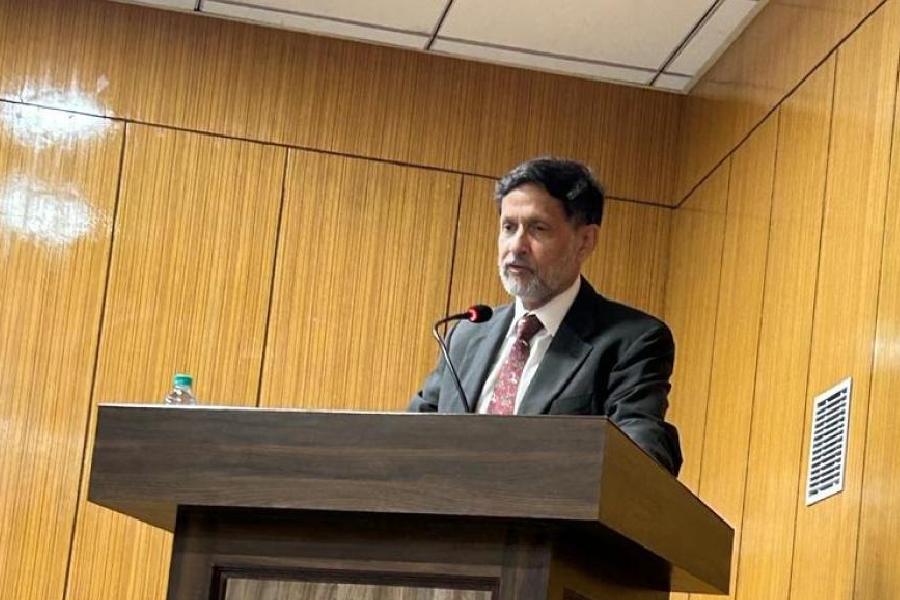India lacks a high-quality database on liver diseases for effective research and the central government should take responsibility, an expert on liver diseases and public health based in the US said on Monday.
“There is really no high-quality database to capture the burden of liver disease in India. So, you don’t know what diseases you have, how much of it you have and whether it looks different in Punjab than in Bengal. If you don’t know the burden of disease there is no way to track it,” said Arun J. Sanyal, director of the Stravitz-Sanyal Institute for Liver Disease and Metabolic Health at Virginia Commonwealth University, Richmond.
Disease burden is the impact of a health problem as measured by financial cost, mortality, morbidity, or other indicators.
Sanyal, who is also the former president of the American Association for the Study of Liver Diseases, was at the Indian Institute of Liver and Digestive Sciences at Sonarpur.
Sanyal was at Sonarpur for a ceremony to formalise a memorandum of understanding (MoU) between his institute and the Liver Foundation, West Bengal.
The collaboration would include sharing research data, training senior and junior professionals of the Sonarpur institute at the Virginia Commonwealth University and holding joint conferences among other things.
“Good research is all about asking good questions. If one cannot articulate a good question then one can do all kinds of research but it is virtually not relevant in
the context. So, it is most important to identify the problems, where are the biggest gaps in caring, what is the burden,” he said.
“There are lots of data on hepatitis but liver diseases is much more than hepatitis and, so, I think it starts by asking and framing questions that are relevant in this context,” said Sanyal.
“Because the goal for the research is to have patients over here and so the learning is from here and others will learn and benefit also. But the primary goal of research done over here is to benefit the people in India and the patients with liver diseases in India,” he pointed out.
Several experts had earlier expressed concerns over a lack of data, the recent being those regarding the actual number of Covid deaths in India.
The Telegraph had earlier reported an international study that suggested over 1.9 million children in India
had lost a parent or a caregiver during the Covid-19 epidemic, estimating a figure 12-fold higher than documented by the Centre and the states.
The Union health ministry had challenged such studies saying they were flawed, speculative and based on unproven assumptions.
But experts had suggested that many deaths during
the pandemic were actually not registered as Covid
deaths because the person could not access proper healthcare.
Asked whether the government was responsible for research activities, Sanyal said: “It’s absolutely a governmental responsibility. This cannot be done by a single institute or an individual. Each state should be responsible for itself. They should be responsible for creating their own infrastructure but the central government should facilitate that and also create a mechanism to collect the data from all the states so that someone can sit in Delhi and say this is what the big picture looks like.”
“The overall responsibility of public health is with the government. Institutes must actively engage with government agencies. All institutes and academics need to take this up with local governments so that it is at least put on the radar and then move forward,” said Sanyal.
In the US, Sanyal said the CDC, Atlanta, does this. There is a network of clinics around the country attached to the research works.
“There is a project called National Health and Nutrition Exam survey where 10,000 patients are randomly picked from the population who are extensively evaluated. There are different approaches followed. You don’t have to spend a billion dollars, but it can be done with the right resources and the right approach,” he said.
“People who set health policy should say, here are our
top five priorities and, I think, the starting point for any health state is to understand the burden of disease. One
per cent improvement, when you are talking about 10 million people, is a lot,” said Sanyal.
Abhijit Chowdhury, chief mentor, Liver Foundation, West Bengal, who was present at the programme, said Covid and dengue had shown how respecting data and the sanctity of maintaining data was crucial to managing public health calamities.
“If there is no proper database, then how can a public health crisis be dealt with?” Chowdhury asked.
